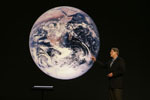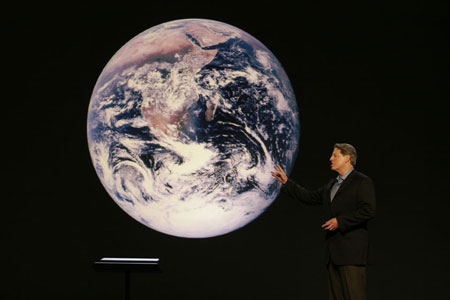An Inconvenient Truth
 “I feel as if we failed to get the message across,” ponders Al Gore while narrating at the introduction of this documentary. He’s referring partly to the public disregard and slide in government policy toward the ecology and environment over the past 30-40 years during his tenure in Congress and as Vice President. Instead of browbeating and “I told you so’s,” Gore tries to approach the present situation by re-evaluating himself, his…
“I feel as if we failed to get the message across,” ponders Al Gore while narrating at the introduction of this documentary. He’s referring partly to the public disregard and slide in government policy toward the ecology and environment over the past 30-40 years during his tenure in Congress and as Vice President. Instead of browbeating and “I told you so’s,” Gore tries to approach the present situation by re-evaluating himself, his…

“I feel as if we failed to get the message across,” ponders Al Gore while narrating at the introduction of this documentary. He’s referring partly to the public disregard and slide in government policy toward the ecology and environment over the past 30-40 years during his tenure in Congress and as Vice President. Instead of browbeating and “I told you so’s,” Gore tries to approach the present situation by re-evaluating himself, his arsenal of facts, and his delivery.
That’s what’s fascinating here. For years, Greenpeace, PeTA and other environmental activist organizations (as opposed to environmental science organizations) have been guilt-tripping everyone with documentaries that rely on anecdotal appeals to emotion rather than on scientific facts and cogent analysis, in an attempt to shock the public into action. The reason this largely fails is because such methods invariably condescend to all but those few who are already on the bandwagon. Here, director Davis Guggenheim films a speech Gore has been giving around the country in a manner that avoids dividing people into groups—Republican vs. Democrat, conservative vs. liberal, SUV driver vs. hybrid owner.
The myriad facts presented are, truly, very well researched and indeed do reflect that the scientific community, unlike the media, are not confused or in considerable disagreement as to the magnitude of influence human beings have on the ecology and environment. Armed with the hard data, Gore revisits the concepts in a colloquial manner distant from his stilted speeches during the 2000 election debates. Describing the vulnerability of Earth’s atmosphere, he summarizes our influence thus, “It’s thin enough that we are capable of changing its composition.” That’s actually an important point, considering that the fundamental obstacle to making the average human aware and concerned about the ecology is a matter of comprehending scale—a problem which the formerly robotic Democrat tackles rather elegantly.
Throughout the film, Gore does an exceptional job of illustrating the disconnect between environmental phenomena and the human perception of scale, limited, as he notes, by our lifespans which are short relative to events that bear consequences over geological time spans—millions and billions of years. In one of the most humorous examples, Gore illustrates on a chart blown up and projected to the size of the entire stage that the climate has risen dramatically in correlation with carbon dioxide emissions in the last fifty years, many times more than in the previous 650,000 years. To reach the graphed line at the end of the chart, he elevates himself on a mechanical lift. The effect is both humorous and unsettling at the same time, as it bridges the problem of scale with the audience.
Is this really Al Gore, or did scientists inject him with Carl Sagan’s charisma? Scattered throughout the film are segments about Gore’s life. These could be taken as appeals to emotion, in a way, but after a while the dots connect back to why he has such strong convictions about preserving our planet—”It’s our only home,” he reminds us. We learn that his father ran a tobacco farm until his sister died of lung cancer. We also learn that his son nearly died in childhood, and the narrow escape became an eternal reminder to Gore and family about the fragility of life. But ultimately the film is not about Al Gore, he’s merely there to present on a subject he’s passionate about. So, smartly, the vignettes about his upbringing, family life and adopted philosophy keep returning to the central discussion of ecology and environment.
My father and I had a conversation the other night regarding the film. For 40 years, my father was an environmental scientist and has contributed numerous peer-reviewed articles to science journals on the ecology and environment including the introductory chapter on the Americas in Cambridge University Press’ Handbook of Ecological Restoration. He said to me that he is intrigued by what’s going on in the minds of people who repeatedly deny the impact humans have on global warming and the data that irrefutably support it. My mind immediately turned to a line from Deepa Mehta’s film, “Water,” in which a guru responds to a question about the conflict between conscience and traditions, stating, “We ignore the laws that don’t benefit us.” Add the word “immediately” to that sentence, and you get the whole picture about global warming. The price of precaution is insignificant when weighed against the cost of ignorance.
 An Inconvenient Truth • Dolby® Digital surround sound in select theatres • Running Time: 100 minutes • MPAA Rating: PG for mild thematic elements. • Distributed by Paramount Classics
An Inconvenient Truth • Dolby® Digital surround sound in select theatres • Running Time: 100 minutes • MPAA Rating: PG for mild thematic elements. • Distributed by Paramount Classics